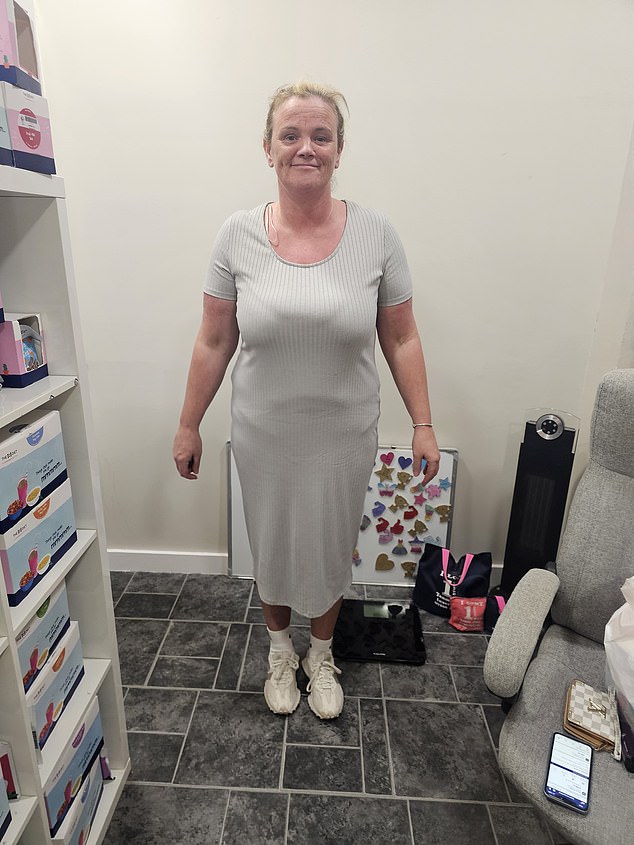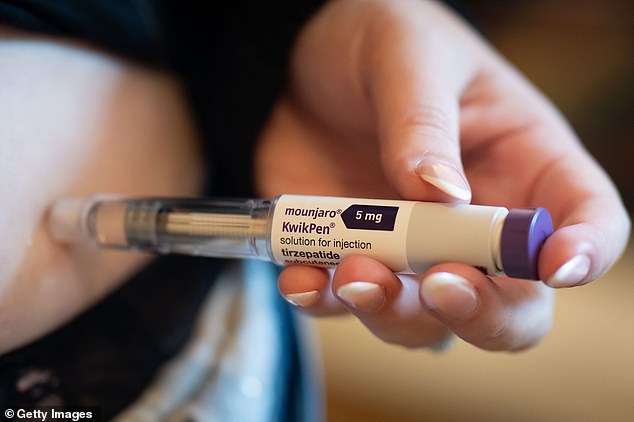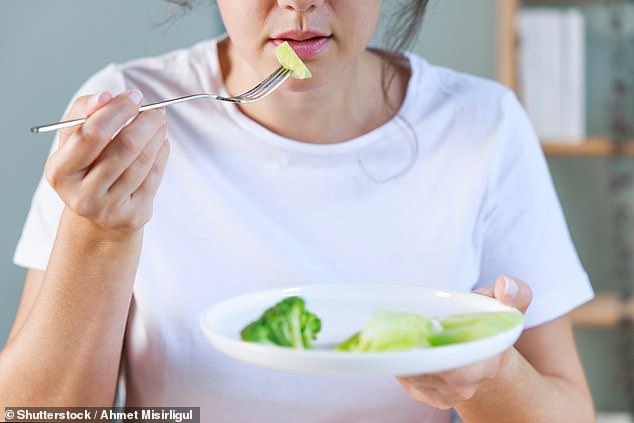Having topped the scales at 15st 7lb, Gillian Coia was delighted that using weight-loss jabs had succeeded where so many diets had failed – helping her to finally slim down.
But while the mother of four lost 2st 7lb in eight months, she was still eating the kind of food that had led to the weight gain in the first place.
‘I was still having Chinese takeaways, McDonald’s, biscuits, crisps and fizzy drinks, but just in smaller portions,’ says Gillian, 44, from Greenock in Scotland.
And her food intake was so reduced that she was missing out on important nutrients.
‘I was tired, my skin was bad, I had no energy and low mood – which I know now can be signs of nutritional deficiencies,’ she says.
What’s more, when the supply of the weight-loss jab, Saxenda, that Gillian had been buying from an online pharmacy dried up, she simply reverted to her old portion size and regained the weight she’d lost within months.
At 5ft 6in, her body mass index (BMI) was soon back at 35, in the obese category.
An estimated 2.5 million people in the UK now use weight-loss injections – and experts fear that an increasing number may be missing out on key nutrients as a result, with some even suffering malnutrition (defined as when your diet does not contain the right nutrients, causing problems such as fatigue and low body weight, and increasing the risk of illnesses and recovery times).

Gillian Coia, 44, from Greenock in Scotland, still consumed ‘Chinese takeaways, McDonald’s, biscuits, crisps and fizzy drinks’ after using weight-loss jabs – just in smaller portions

She is pictured after using Mounjaro. Gillian weighed 15st 7lb at her heaviest
The drugs, known as GLP-1 agonists, contain peptides – artificial proteins – that signal to the brain to say you’re full; they also slow the emptying of the stomach, meaning you can consume only minimal amounts of food.
The risk is that if your diet is poor to begin with, you miss out on key nutrients.
It’s a worryingly common problem, with research just published in the journal Obesity Pillars revealing that more than a fifth of those on weight-loss jabs are malnourished.
The study of more than 460,000 people in the US found that after a year on GLP-1 jabs, 22.4 per cent had nutritional deficiencies – the most common being vitamin D (found in fish, eggs and cheese).
Compounding the problem is the fact that many people carrying excess weight will already be deficient in essential vitamins and minerals, says Dr Dipesh Patel, a consultant endocrinologist at the Royal Free Hospital in London.
A review in the journal Obesity Medicine in 2020 found that obese patients were more likely to be deficient in nutrients such as vitamins A, B1, B9 and D, as well as zinc, manganese, magnesium and chromium – which the researchers said was largely due to poor intake of fruit and veg.
‘If you’re then taking a medication that reduces your appetite, and you’re eating less – and that food is the same as before and not nutritious – it can lead to deficiencies,’ says Dr Patel.
‘We see this in around 20 per cent of our patients using GLP-1 injections, such as Mounjaro, Wegovy and Saxenda, when we routinely test for certain vitamins and iron in their blood around six months after they start.’
A lack of these nutrients can lead to symptoms such as weakness, fatigue, reduced immunity, hair loss, brittle nails and dry skin. Longer-term risks include nerve damage, depression, heart problems and bone thinning.
A typical case is a patient who was consuming three slices of pizza and sugary tea all day, who then paid privately for a weight-loss drug, as she needed to lose weight to get a hip replacement on the NHS, explains Dr Ellen Fallows, a GP based in Northamptonshire and former vice president of the British Society of Lifestyle Medicine.

Weigh-loss drugs, known as GLP-1 agonists, contain peptides – or artificial proteins – which send messages to your brain to say you’re full
‘But on the GLP-1 injections, she was having just one slice of pizza and one cup of sweet tea each day – stories like this are common and worrying.’
Research by Dr Fallows – currently being reviewed prior to publication – found a significant proportion of people using weight-loss drugs eat less than 800 calories a day.
‘When you consume less than 800 calories it’s difficult to meet your nutritional needs,’ she says.
Alarmingly, there have been around 20 cases in the US – reported in several journals including The American Journal of Gastroenterology – of people on weight-loss jabs becoming so deficient in vitamin B1 (found in nuts, meat, wholegrains and beans) that they developed the brain condition encephalopathy, which causes memory loss, confusion and personality changes.
‘That’s permanent brain damage in young, otherwise healthy people,’ says Dr Fallows.
It’s not just the lack of food that’s the issue – as Dr Fallows explains: ‘We’re slowing digestion down, and food is sitting in your stomach for a lot longer – and we have no idea if that makes a difference to how effectively nutrients are absorbed into the body.’
Whatever the cause, a lack of nutrients can have serious consequences for health.
Not eating enough calcium – found predominantly in dairy – can lead to a drop in bone mass, raising the risk of osteoporosis (thinning bones), explains dietitian Marcela Fiuza, a spokesperson for the British Dietetic Association.
‘Women using weight-loss injections need to pay particular attention to their calcium intake, and make sure they have a vitamin D supplement [this helps the absorption of calcium].’ The NHS says women need at least 10mg daily.
People on GLP-1 drugs often complain of fatigue, ‘which is usually down to a lack of iron and vitamin B12, which is found in animal-based products’, says Ms Fiuza, adding that this can also cause hair loss, brittle nails and problems with skin, such as dryness and poor healing.
Eating adequate protein is key, too, to offset the loss in muscle mass (research published in the journal Expert Opinion on Pharmacotherapy last year suggests up to 40 per cent of GLP-1 weight loss comes from losing muscle) and reduce the risk of frailty and falls.
‘Muscle also keeps the metabolism active, so losing too much lowers the rate of calorie burn and raises the risk of regaining weight once medication is stopped,’ says Ms Fiuza.
But breaking the dietary habits of a lifetime can be hard, as Gillian found.
Last year she tried taking Mounjaro: ‘Instead of having three biscuits, I’d have half of one; or I’d order a McChicken sandwich, chips and a milkshake for dinner – but only eat half of the meal.

As many as 2.5 million people in the UK now use weight-loss injections, but doctors fear the drugs could lead some down a path to malnutrition
‘I was barely having any fruit or vegetables. I felt tired and my skin was breaking out a lot,’ she says.
Dr Patel says getting the right support while using GLP-1 drugs is vital – ‘whether it’s seeing a dietitian or using a digital support programme approved by NICE (the National Institute for Health and Care Excellence), which don’t cost much [around £30 a month]’.
Around 90 per cent of people on GLP-1s obtain them privately, often without the kind of regular health checks seen on the NHS.
People should start on the lowest possible dose of the medication that helps with weight loss but still allows them to eat, advises Ms Fiuza.
‘If a main meal is small it doesn’t matter, but prioritise eating the protein, whether it’s from fish, chicken or lentils, first before you fill up on something else, and balance the rest with vegetables and whole grains.’
Take a multivitamin supplement as a safety net to ensure you meet your nutritional requirements while on the drugs, she adds.
After four months, Gillian came off Mounjaro last summer as the side-effects – including headaches and stomach cramps – were too much for her to handle.
In February, she moved on to the 1:1 Diet by Cambridge Weight Plan, which offers education on diet choices and nutritionally enriched milkshakes and snack bars, alongside eating healthy meals. She now weighs around 10st and is a size 10.
‘For the first time in my life I have a healthy BMI,’ says Gillian, who’s replaced her takeaways and snacks with fish, lean meats, salad and vegetables.
‘I have more energy, I walk my dogs for two hours every day and go to exercise classes, my skin is clearer – and I’m sleeping much better.
‘Weight-loss drugs are a good quick fix, but they’re not a long-term solution unless people learn better eating habits, too.’
